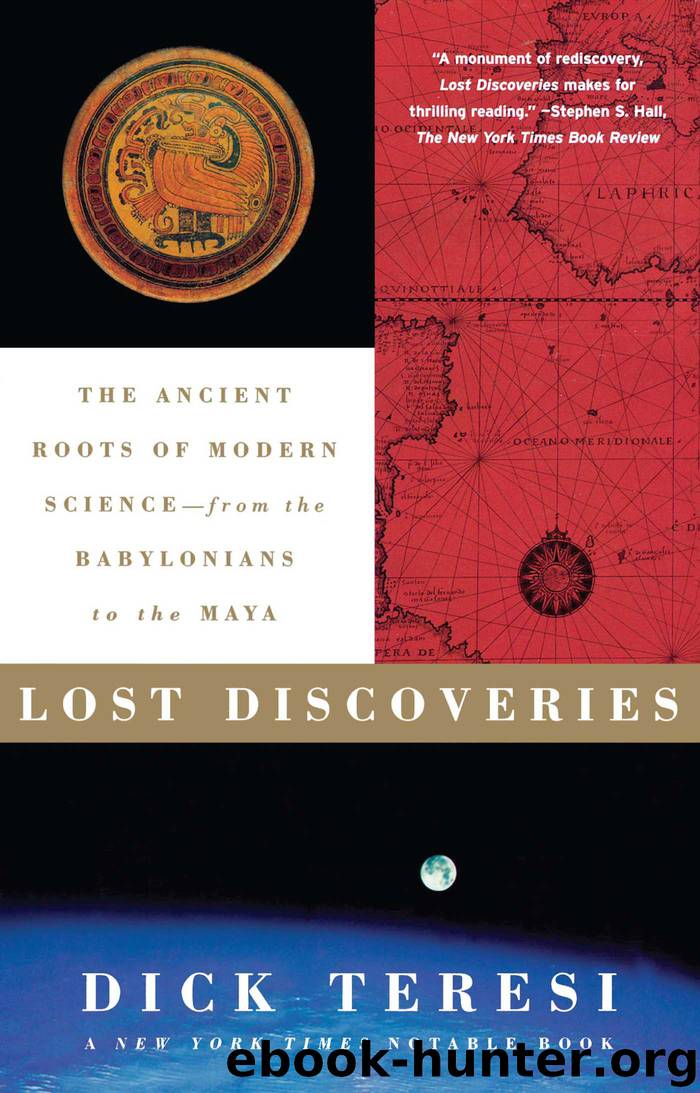Lost Discoveries by Dick Teresi

Author:Dick Teresi
Language: eng
Format: epub
Publisher: Simon & Schuster
Published: 2001-12-31T16:00:00+00:00
6
GEOLOGY: Stories of Earth Itself
IN some ways, geology is the most evident of sciences, with the processes of sedimentation and erosion etched in the land around us. Modern field geologists still rely heavily on a rock hammer and their eyes for observation, both of which were available to early peoples. Geology, like other sciences, has its roots in a slow compilation of observations and practical knowledge, which eventually was fused with philosophical ideas to yield theories.
Prehistoric peoples must have had intimate knowledge of the qualities of the stones they depended on in order to live. Neanderthal humans in the Middle Pleistocene crafted stone tools of a specific form known as Mousterian.1 They used two methods: by chipping at the stone core to create the tool, and by using the chips themselves as the tools.2 Geologist Gordon Childe says that “both procedures demand both great dexterity and considerable familiarity with the properties of the stone utilized. Just bashing two stones together is not likely to yield a useable flake or core tool. To produce either the blow must be struck with precisely the right force and at the correct angle on a flat surface.”3 Modern geology students who have attempted to make their own tools in this fashion can vouch for the difficulty involved. One student told me she spent a full morning trying to make a stone cutting tool from two pieces of flint she found on the beach.
A distinctive side-scraper tool was used for half a million years, and the struck-flake tool was characteristic from southern Africa to Europe.4 Childe asserts that such skill was passed down through thousands of generations. Museums today contain tens of thousands of hand axes, all of the same pattern and hewn from the same materials. Childe finds it “highly improbable that so many hominids in the long Lower Paleolithic Age should each by individual trial and error [have] selected flint of the nearest available microcrystalline stone and independently hit upon the same method for shaping it.”5
Early peoples also used the sedimentary nature of rock outcrops to their advantage. Even if they didn’t speculate on the origins of this layering of stone, they surely knew that the sediments predictably repeated themselves from outcrop to outcrop. Childe writes that Neolithic miners sank shafts through ten feet or more of solid chalk in order to reach layers of flint. There would have been no surface indications of the flint. “They must have observed an exposure of the flint-bearing layer in a ravine or on a scarp,” says Childe, “and correctly inferred that it continued below the surface into the hillside.”6
Download
This site does not store any files on its server. We only index and link to content provided by other sites. Please contact the content providers to delete copyright contents if any and email us, we'll remove relevant links or contents immediately.
| Africa | Americas |
| Arctic & Antarctica | Asia |
| Australia & Oceania | Europe |
| Middle East | Russia |
| United States | World |
| Ancient Civilizations | Military |
| Historical Study & Educational Resources |
The Daily Stoic by Holiday Ryan & Hanselman Stephen(3287)
The Fate of Rome: Climate, Disease, and the End of an Empire (The Princeton History of the Ancient World) by Kyle Harper(3046)
People of the Earth: An Introduction to World Prehistory by Dr. Brian Fagan & Nadia Durrani(2718)
Ancient Worlds by Michael Scott(2661)
Babylon's Ark by Lawrence Anthony(2659)
The Daily Stoic by Ryan Holiday & Stephen Hanselman(2560)
Foreign Devils on the Silk Road: The Search for the Lost Treasures of Central Asia by Peter Hopkirk(2451)
India's Ancient Past by R.S. Sharma(2438)
MOSES THE EGYPTIAN by Jan Assmann(2406)
The Complete Dead Sea Scrolls in English (7th Edition) (Penguin Classics) by Geza Vermes(2268)
The Earth Chronicles Handbook by Zecharia Sitchin(2211)
Lost Technologies of Ancient Egypt by Christopher Dunn(2210)
24 Hours in Ancient Rome by Philip Matyszak(2071)
Alexander the Great by Philip Freeman(2052)
Aztec by Gary Jennings(2011)
The Nine Waves of Creation by Carl Johan Calleman(1901)
Curse Tablets and Binding Spells from the Ancient World by Gager John G.;(1856)
Before Atlantis by Frank Joseph(1842)
Earthmare: The Lost Book of Wars by Cergat(1813)
